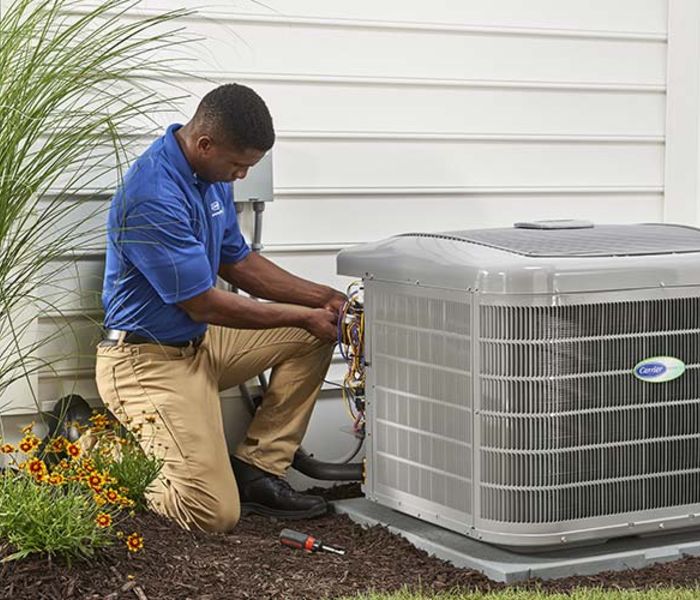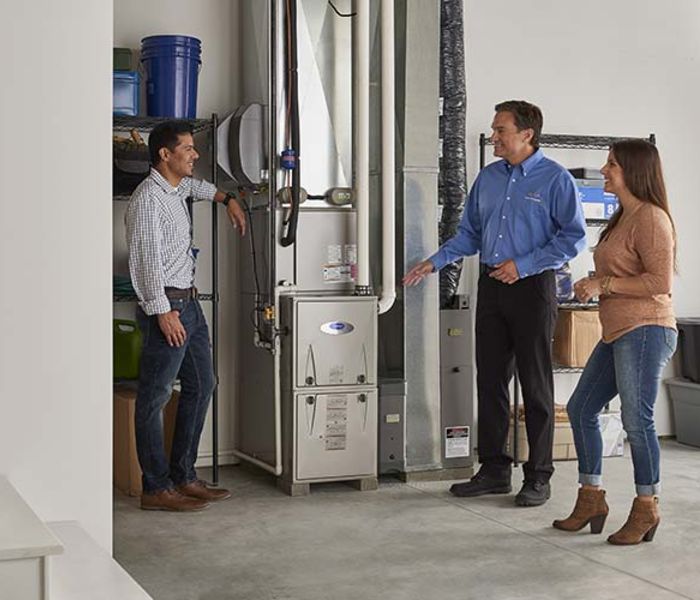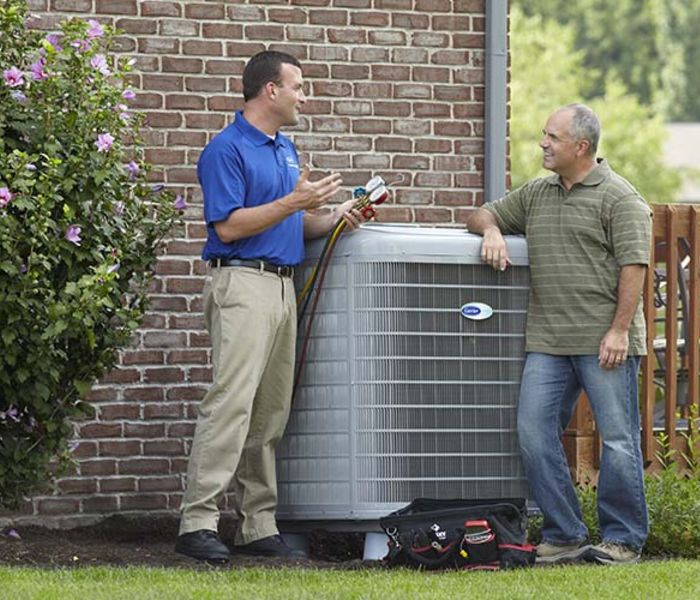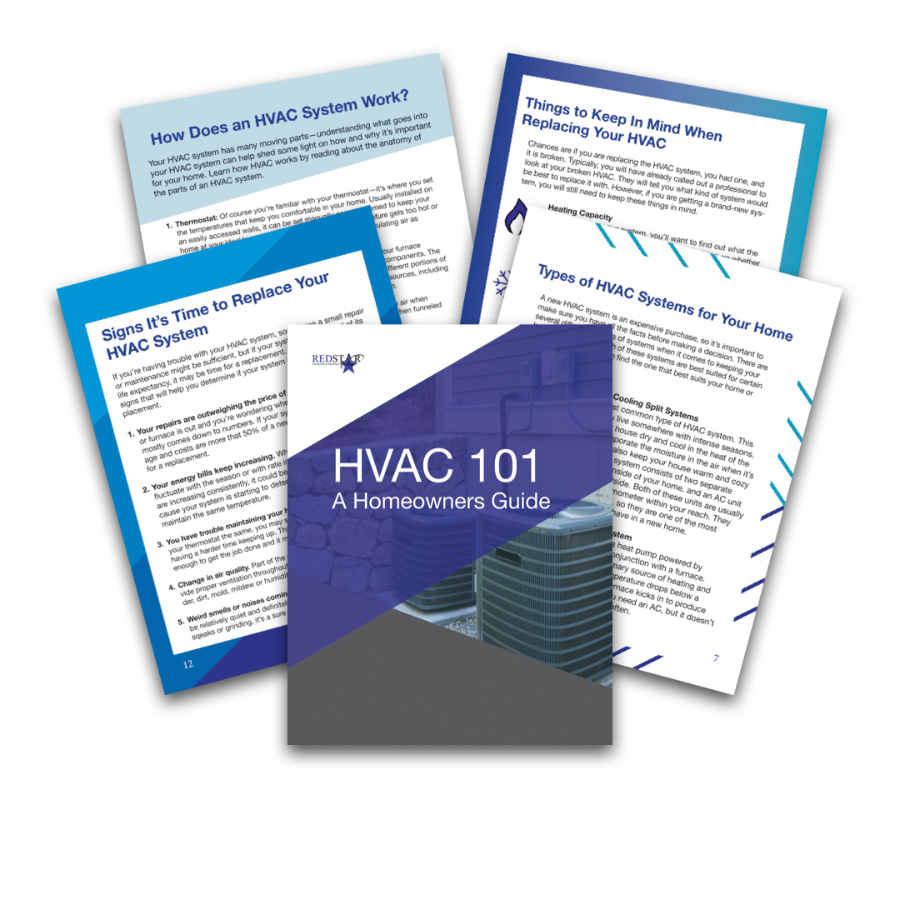Sharing is caring!
Many homeowners fail to realize that there are several different types of residential cooling systems available for homes today, which might be installed in place of a central air conditioner or along with such a unit. Knowing your options for residential air conditioning ensures you choose the best system for your home and enjoy cooling comfort for many years to come.
Popular varieties of residential cooling systems include:
- central air units
- split system air conditioning
- heat pumps
- window air conditioners
- portable AC units
Central air conditioners are a favorite as they cool an entire home while split system units save money by cooling only a small section of a home, as needed.
If your home needs a new residential air conditioning system or if you’re having a home built and you need to choose the right cooling system for your new house, you might consider some vital details about each choice available today. You can then decide the best residential cooling system for your home based on your budget, your family’s needs for cooling, and other such important details.

Understanding Your Options for Residential Cooling Systems
Since there is no right or wrong answer as to which residential cooling system is the best for each home, you might just consider some details about standard options for houses today. Discuss these options with a cooling and heating contractor near you and then decide which is the right system for your home!
- A central air conditioner uses a compressor situated outside the home to create cooled air that is then circulated through the furnace filter and the home’s ductwork. Central air conditioning systems push air through all the vents in each room, cooling those rooms equally. These units provide maximum comfort but might also mean cooling unoccupied rooms, wasting money and energy in the process.
- While central air conditioners might use the most amount of energy, they also tend to remove the most amount of humidity as well! Other residential air conditioner systems might not operate long enough or be powerful enough to remove excess humidity in a home so that the air then tends to feel cool but clammy.
- Split system air conditioning units or wall systems are typically found in hotel rooms; these push cooled air through a vent on their front panel, cooling one room or zone at a time. Split systems are also used in homes and small buildings without ductwork, or where cooling is needed specifically, such as a room with extreme sun exposure.
- Split systems are also an excellent choice for smaller homes where a central unit might be overly powerful. They can be installed with a central unit so you can use them to cool certain spaces as needed, such as just a bedroom or family room when other rooms are unoccupied.
- Another advantage of split system units is that the panel can be installed in a wall or ceiling, or any unobtrusive spot that still provides excellent air circulation. In some homes, vents located near floors get blocked by furniture and those near the ceiling might not push air around seating areas, whereas a split system unit allows for added flexibility.
- Heat pumps pull heated air from one place to another. During summer months they pull heated air from the home and vent it outside; during wintertime, this process is reversed.
- Window air conditioners and portable units are an excellent choice for cooling just one room at a time; many homeowners use these in addition to central residential air conditioners. However, they have very limited cooling capacity and might make lots of noise when in use!
- Window air conditioners and portable units might also do little to remove excess humidity, so that you often need to use an additional dehumidifier along with the air conditioner itself.
Avoid Common Mistakes When Choosing a Residential Cooling System
Before you choose a residential air conditioner system, you might note some common mistakes made by many homeowners, so you can avoid those same mistakes yourself! This will help you make the best decision when it comes to an air conditioner for your home, no matter its size or your cooling needs.

One mistake many homeowners make is thinking that bigger is better when it comes to a residential air conditioning installation! While more cooling power might seem like a good thing, note that a residential air conditioner system needs to cycle on for several minutes in order to remove humidity from the air. An oversized or overpowered unit that blasts cool air through a home and then shuts off might create a cold, clammy interior environment, not a comfortable one!
In the same way, a homeowner shouldn’t choose an underpowered unit, perhaps thinking that they can simply run the unit longer to get the cooling they need throughout their home. A central air conditioner and split system provide only so much cooling and air circulation capacity, so that they cannot cool the air faster than it warms during summer months! Invest in an air conditioner size and power level suited to your home’s size and overall cooling needs instead.
Another mistake made by homeowners is choosing the cheapest air conditioning on the market. While not every expensive residential AC system is the best, a cheaper system might be very energy inefficient so that it then uses more power over time, spiking your utility costs. A cheaper system might also tend to break down sooner rather than later, and needed air conditioning repairs and heating system servicing mean more costs over the lifetime of home ownership.
It’s also easy for homeowners to assume that they can or should just pick one air conditioning or residential cooling system for their home. This is not always the case; for example, a central AC unit is an excellent option for larger families, providing even cooling throughout all the home’s occupied rooms.
However, you might also choose a split system unit that cools the family room and kitchen, so you can turn off the central unit but still keep those rooms cool when everyone is eating or watching a movie together. Or, you might choose window units for each bedroom along with a central air conditioner, allowing you to cool those spaces as needed during the night without wasting energy by cooling unoccupied spaces.
How to Save Money on Your Residential Cooling System Costs
When choosing a new residential air conditioning installation, you don’t want to choose the cheapest option, as said. However, this doesn’t mean you can’t save some money on those air conditioning installation costs and the use of your residential AC unit over the years!

One consideration is investing in an energy-efficient air conditioning unit. Energy-efficient doesn’t necessarily mean that an AC unit uses less electricity, but that the majority of electricity it uses is for cooling versus running other parts. You might cool larger areas or cycle on the unit more often without paying more money, or have lower electric bills when you choose an energy-efficient residential AC unit.
Also, ask your air conditioning installation contractor about cost saving opportunities. He or she might know of manufacturer rebates, closeout sales, discontinued models, and even tax incentives for various units. Waiting for a sale or choosing a discontinued model might mean hundreds of dollars in savings for your residential air conditioning installation costs.
It’s also good to consider how to update your home for maximum air conditioning and residential cooling cost savings. New insulation, thick drapes that block both hot sunshine and warm air from outside the home, a high-quality dehumidifier, and updated roof vents can all mean a more comfortable interior environment. These simple updates can also allow your air conditioner to run more efficiently, cooling your home without cycling on as often and, in turn, saving you money on your air conditioning and residential cooling costs.
Quick Tips When Choosing a Residential Cooling System Size
Your residential cooling size is based on your home’s overall square footage, but you might note a few added factors to consider. For example, homes with lots of direct sunlight and not a lot of shade trees will usually need a stronger cooling system than average. Poor insulation also means a warm interior environment and the need for stronger cooling.
It’s also easy to forget that more people in the home means more body heat! You might not think that you and your family are generating much heat that then gets trapped in the home but the more occupants in the house, and especially if they’re all home at one time, the more cooling you’ll need.
This information doesn’t mean that you’ll always need a more powerful cooling system than average! A single person or couple who often occupy the same room, so that the entire home doesn’t need added cooling, might find that the least powerful residential cooling system is sufficient. Some persons also tend to enjoy a warmer environment and don’t run their home’s air conditioner incessantly, and they might also find a less powerful system suffices.





